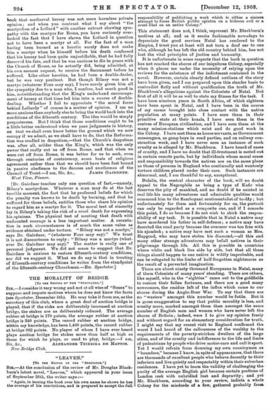"LEAVEN."
[To TES EDITOR 01 TES " Eirgarnos."1
Sxa,—At the conclusion of the review of Mr. Douglas Black- burn's latest novel, " Leaven," which appeared in your issue of September 26th, the writer says :— " Again, in issuing the book over his own name he shows he has the courage of his convictions, and is prepared to accept the full responsibility of publishing a work which is either a sincere attempt to focus British public opinion on a hideous evil or a cruel libel on an entire Colony."
This statement does not, I think, represent Mr. Blackburn's motives at all; and as it seems fashionable nowadays to depreciate the good services Natal has rendered to the Empire, I trust you at least will not turn a deaf ear to one who, although he has left the old country behind him, has not lost the vital principles of justice and humanity.
It is unfortunate in some respects that the book in question has not reached the shores of our iniquitous Colony, especially when it places me under the necessity of relying upon the reviews for the substance of the indictment contained in the novel. However, certain clearly defined outlines of the story have been given, and I am prepared upon this slender basis to contradict flatly and without qualification the truth of Mr. Blackburn's allegations against the Colonists of Natal. But first of all it will be as well to state my fitness for the task. I have been nineteen years in South Africa, of which eighteen have been spent in Natal, and I have been in the course of my career brought into close contact with the native population at many points. I have seen them in their primitive state at their kraals, I have seen them in the centres of European civilisation, and I have seen them at the many mission-stations which exist and do good work in the Colony. I have met them as house servants, as Government messengers, as gang-boys in road parties, and on railway con- struction work, and I have never seen an instance of such cruelty as is alleged by Mr. Blackburn. I have heard of cases of cruelty, and I have no doubt that ill-treatment is meted out in certain remote parts, but by individuals whose moral sense and responsibility towards the natives are on the same plane as those of persons in England who continually and wantonly torture children placed under their care. Such instances are abnormal, and, I am thankful to say, exceptional.
Bulalie, the central character of the book, will no doubt appeal to the Negrophile as being a type of Kafir who deserves the pity of mankind, and no doubt if he existed in real life his many adventures and admirable qualities would commend him to the flamboyant sentimentalist of to-dly ; but unfortunately for them and fortunately for us, the portrait can only be regarded as a composite one, and if I concede this point, I do so because I do not wish to shirk the respon- sibility of my task. It is possible that in Natal a native may have murdered his father in self-defence; a native may have deserted the road party because the overseer was too free with his sjambok; a native may have met such a woman as Mrs. Hapgood, who may have stolen his diamond,—all this and many other strange adventures may befall natives in their pilgrimage through life. All this is possible in countries where white and black live side by side, but that all these things should happen to one native is wildly improbable, and can be relegated to the limbo of half-forgotten nightmares as the result of a perverted imagination.
There are about ninety thousand Europeans in Natal, many of them Colonists of many years standing. There are others, like myself, who in the "eighties" came out to the goldfields to restore their fallen fortunes, and there are a good many newcomers, the residue left of the influx which came to our shores during the. Anglo-Boer War. To say that there are no " wasters " amongst this number would be futile. But it is gross exaggeration to say that public morality is less, and cruelty more, marked amongst them than amongst the same number of English men and women who have never left the shores of Britain ; indeed, were I to give my opinion freely and without regard for an elementary consideration for truth, I might say that my recent visit to England confirmed the worst I had heard of the callousness of the wealthy to the requirements of the poverty-stricken dwellers of the large cities, and of the cruelty and indifference to the life and limbs of pedestrians by people who drive motor-cars and call it sport. Yet I would refrain from damning my own countrymen as " bounders," because I know, in spite of appearances, that there are thousands of excellent people who behave decently to their inferiors and live quietly and respectably within their suburban residences. I have yet to learn the validity of challenging the purity of the average English girl because certain portions of London reek with unbridled lust and depravity ; and yet Mr. Blackburn, according to your review, indicts a whole Colony for the misdeeds of a few, gathered probably from Police Court records and other sources available to journalists. I have no wish to deny Mr. Blackburn's cleverness in placing the worst construction upon the attitude of the Colonist towards the Kafir, and I appreciate his power of satirical observation, but I resent his unblushing effrontery in taking upon himself the task of bringing odium upon the Colony of Natal.—I am, Sir, &c., NATALIAN.































































 Previous page
Previous page